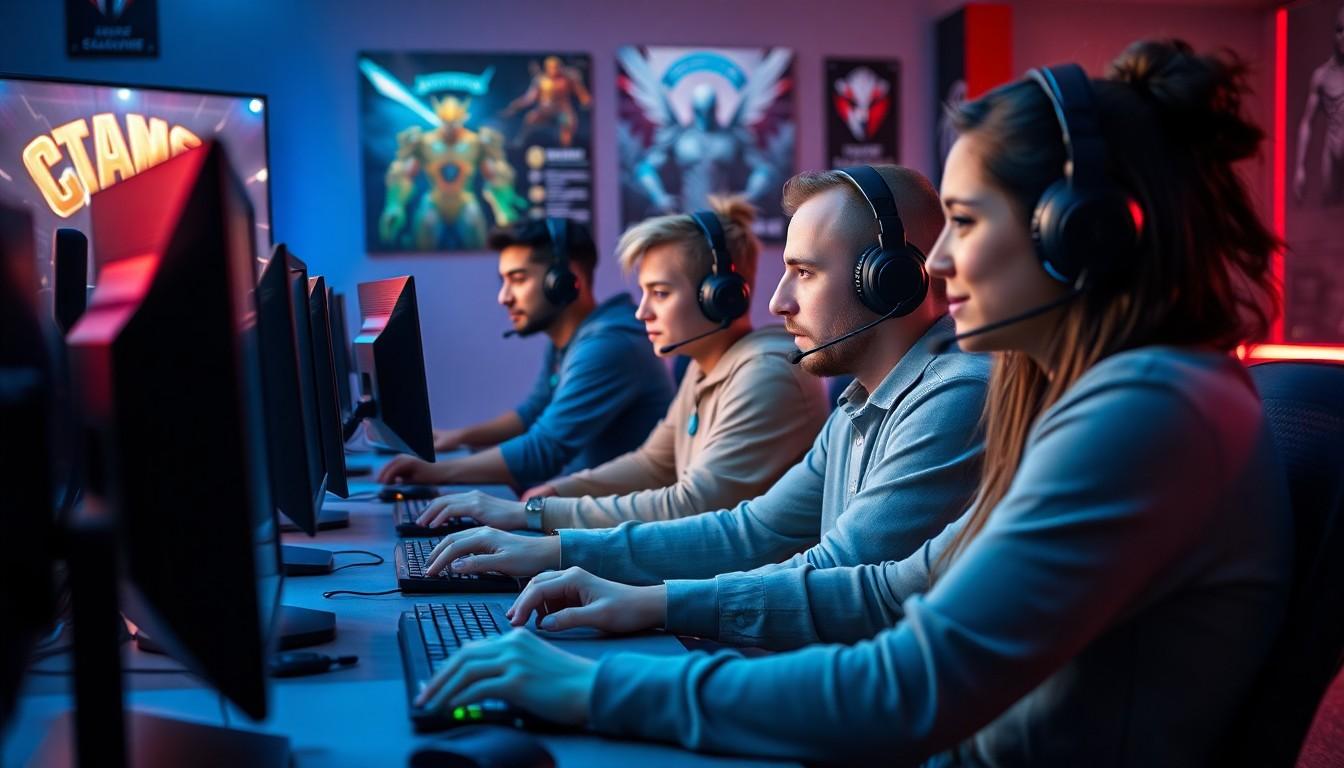Team Based Video Games: The Ultimate Guide to Success and Collaboration in Gaming

In the ever-evolving world of gaming, team-based video games have taken center stage, proving that teamwork really does make the dream work. Gone are the days when solo players ruled the roost; now it’s all about strategizing with friends or random allies to achieve victory. Whether it’s storming the battlefield in a first-person shooter or coordinating a complex heist in an online RPG, these games bring players together like peanut butter and jelly—if jelly had the power to blow up a tank.
Team Based Video Games
Team-based video games represent a significant evolution in gaming, shifting players’ focus from individual skills to collaborative strategies. These games, found across various genres, rely on teamwork to succeed, creating a dynamic interplay among players. First-person shooters, multiplayer online battle arenas (MOBAs), and co-op role-playing games (RPGs) exemplify this trend.
The success hinges on effective communication and coordination among team members. Players often need to capitalize on their individual strengths and complement each other’s weaknesses. For example, a tank character in a MOBA absorbs damage while support characters provide healing and buffs. Synergy becomes crucial; teams that foster trust and collaboration consistently outperform disjointed groups.
Statistics indicate that team-based games generate higher player retention rates than solo titles. Multiplayer gaming platforms, such as Steam and Xbox Live, have noted a surge in community engagement, attributing it to the social aspects of these games. A report by Newzoo highlights that 78% of gamers enjoy playing with friends, reinforcing the trend towards cooperative gameplay.
Competitive team-based gaming also extends to organized leagues and tournaments. Professional teams in games like Overwatch and League of Legends showcase elite teamwork, drawing massive audiences. These events not only enhance the popularity of team-based games but also provide players with a platform for recognition and rewards.
Team-based video games cultivate a cooperative environment that appeals to many players. As teamwork remains essential, these games continue to shape the landscape of modern gaming through community engagement and competitive play.
Benefits of Team Based Video Games

Team-based video games offer numerous advantages that enhance both personal skills and social interactions. These games create environments that foster essential abilities like communication and collaboration.
Enhancing Communication Skills
Effective communication thrives in team-based video games. Players often strategize, share game updates, and provide feedback, leading to improved verbal skills. Real-time discussions, whether through voice chat or text, require clear messaging and active listening. They must convey complex ideas succinctly. These interactions lead to greater comprehension of team dynamics and build confidence in public speaking. Participants often report enhanced communication abilities outside gaming contexts, demonstrating the far-reaching impacts of their experiences.
Promoting Collaboration
Players engage in collaborative efforts while pursuing shared goals in team-based video games. Each player’s unique abilities contribute to the team’s success, requiring players to embrace their roles within the group. When they adapt strategies based on team performance, an increased sense of unity forms. Team-based formats encourage players to work together under pressure, cultivating essential skills like problem-solving and mutual support. Participants often develop friendships and strong bonds, translating gaming cooperation into real-life teamwork scenarios.
Popular Team Based Video Games
Team-based video games offer diverse experiences that appeal to various player preferences. The following sections detail classic titles alongside recent releases, showcasing popular choices in the genre.
Classic Titles
Classic team-based games shaped the multiplayer landscape. Counter-Strike remains a long-standing icon among shooters, emphasizing tactical play and communication. Team Fortress 2 introduced distinct classes, promoting strategy and teamwork. Rainbow Six Siege features detailed teamwork mechanics, requiring players to execute precise strategies with their squads. Overcooked encourages cooperation in frantic kitchen environments, turning players into chefs who must work together under pressure. Such titles created a foundation for cooperative gameplay and set benchmarks for team dynamics.
New Releases
New team-based games continue to innovate and attract players. Valorant combines strategic shooting with unique character abilities, emphasizing cooperation and synchronized team play. Call of Duty: Warzone incorporates large-scale team battles in a constantly evolving environment, maintaining engagement through updates and events. Apex Legends introduced a ping system that streamlines communication, allowing players to strategize without vocal chat. Back 4 Blood delivers intense cooperative gameplay, allowing squads to fend off hordes of zombies together. These modern titles reflect ongoing trends in collaboration and competition in gaming.
Strategies for Success in Team Based Video Games
Success in team-based video games relies heavily on effective strategies. Players can enhance their game experience and performance by adopting various techniques.
Communication Techniques
Establishing clear communication enhances team dynamics. Players should use voice chat for real-time coordination. Text-based chat serves well for strategy discussion during quieter moments. Active listening fosters understanding and reduces misunderstandings. Players should provide timely updates on their location and status, allowing for better tactical decisions. Encouraging positive feedback promotes morale, helping players stay engaged and focused. Using specific callouts for positions or actions leads to quicker responses. Utilizing in-game tools, like ping systems, ensures that crucial information gets relayed efficiently.
Role Specialization
Understanding and embracing individual roles strengthens overall team efficiency. Players can choose to fulfill specific roles, such as support or damage dealers, maximizing overall contribution. Each role’s capabilities should complement others, leading to a balanced team. Players focusing on healing support boost resilience, while frontline tanks absorb damage effectively. Attackers create opportunities for successful strategies by pushing objectives. Emphasizing individual strengths helps teams create effective synergies. Players might also adapt roles based on team needs, demonstrating flexibility and cooperation. Mastering specific roles allows players to deepen their strategic impact on gameplay, enhancing team performance.
Future Trends in Team Based Video Games
Emerging technologies play a crucial role in shaping the future of team-based video games. Virtual reality (VR) and augmented reality (AR) integrate realism and immersion, allowing players to experience collaboration in new environments. Titles utilizing these technologies, such as Rec Room for VR, are gaining popularity for their engaging teamwork dynamics.
Artificial intelligence (AI) continues to enhance gameplay by providing intelligent NPCs (non-player characters) that assist teams. Games with AI-driven characters adapt to player strategies, creating unique challenges and improving coordination. The integration of AI algorithms in matchmaking also optimizes team compositions, ensuring balanced gameplay.
Cross-platform play has expanded, breaking down barriers among gaming platforms. Players now enjoy seamless interaction across consoles and PCs, fostering larger communities that emphasize team engagement. This trend leads to increased player retention and expands the player base for popular titles.
The esports industry is experiencing rapid growth, with team-based games at the forefront. Numerous tournaments and leagues showcase professional-level teamwork, attracting significant audiences. An increase in sponsorships and broadcast deals highlights the economic potential of this competitive landscape.
Player-generated content is on the rise, as communities create custom maps, mods, and scenarios. This trend encourages collaboration beyond traditional gameplay, allowing players to engage creatively while working together. Popular titles like Fortnite exemplify how community input shapes game development and enhances teamwork experiences.
In the realm of monetization, free-to-play models thrive, incentivizing social play. Games like Apex Legends attract players by offering characters and cosmetics without upfront costs, drawing in new collaborators. This model fosters diverse team formations as friends join in to experience new content together.
Lastly, the focus on mental health and well-being is becoming significant. Developers incorporate features that promote healthy gaming habits, ensuring players maintain a balanced lifestyle while enjoying team play. Games that facilitate positive social interactions contribute to overall player satisfaction and community cohesion.
Collaboration and Foster Friendships
Team-based video games have undeniably transformed the gaming landscape. They encourage collaboration and foster friendships while enhancing communication skills. As players engage in strategic gameplay, they develop a sense of community that extends beyond the digital realm.
The future of these games looks promising with advancements in technology and growing esports popularity. Emerging trends like VR and AI will further enrich the gaming experience, making teamwork even more critical. As developers prioritize mental health and social interactions, team-based games will continue to thrive, attracting more players and creating lasting bonds.



